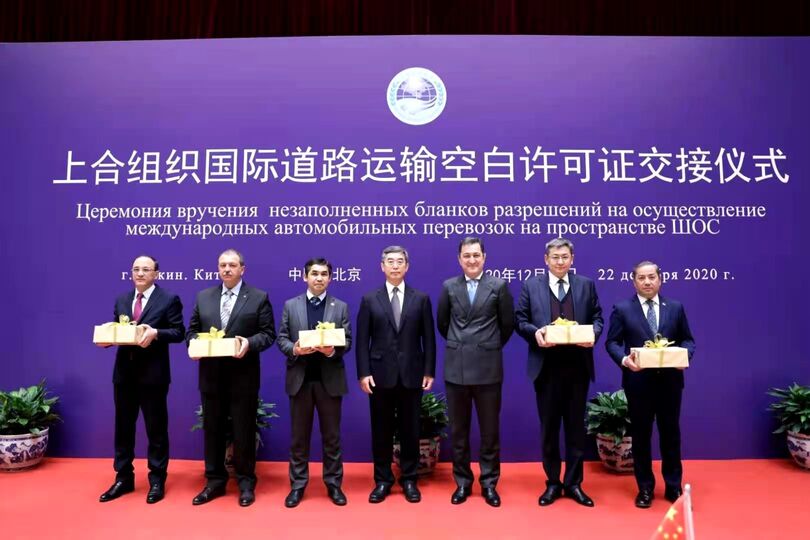On 22 December 2020, the Ministry of Transport of the People's Republic of China held a ceremony for the transfer of forms under the Agreement on Facilitation of International Road Transport.
The event was attended by Deputy Secretary-General of the Shanghai Cooperation Organisation Sherali Jonon, the permanent representatives of the SCO member states at the SCO Secretariat from the Russian Federation, the Republic of Uzbekistan, the Republic of Tajikistan, the Republic of Kazakhstan, the Kyrgyz Republic and the top executives of the Ministry of Transport of the PRC.
Opening the ceremony, China's Vice Minister of Transport Dai Dongchang noted that the coordination of six routes carried out within the framework of the Agreement contributes to the creation of favourable conditions for the development of transport networks, the opening of new overland multimodal transport corridors and the intensification of trade and economic cooperation among the SCO member states. According to Dai Dongchang, for the implementation of these goals, China has produced 1,200 forms of operating permits for international road transport in order to pass them on to the SCO member states.
The Vice Minister of Transport stressed that, despite the negative impact of the coronavirus pandemic, the parties are implementing previously reached agreements based on the Shanghai Spirit principles, which helps promote the realisation of the concept of Community with a Shared Future for Mankind put forward by the Chinese President Xi Jinping. Dai Dongchang expressed hope for the restoration of cooperation in the field of transport and communications as the situation with the pandemic normalises.
SCO Deputy Secretary-General Sherali Jonon noted in his speech that the continuation of work amid the pandemic is a demonstration of the Organisation's strength and unity, and the favourable conditions being created at the checkpoints will contribute to the early recovery of the economy and trade in the SCO countries.
Sherali Jonon said that the SCO member states pay great attention to promoting and expanding cooperation in the field of transport and communications, infrastructure interconnectedness and the creation of modern transport infrastructure with the use of new technologies. According to him, the implementation of these measures will contribute to strengthening trade and economic ties in the SCO region and will give a significant impetus to regional development across the SCO space.
He stressed the importance of developing transport infrastructure, building and commissioning multimodal logistics centres, railway transport facilities and warehouses in the border areas of the SCO member states. He also spoke about the urgency of introducing a unified system for monitoring cargo flows across the SCO space, establishing information exchange, and unifying customs and phytosanitary requirements, which will make transport cooperation more effective.
The permanent representatives of the SCO member states to the SCO Secretariat drew attention to the need to develop cooperation in the field of transport and communications within the framework of the adopted multilateral documents in this area and the established mechanisms of interaction. They noted that more active cooperation in this area will contribute to the restoration of economic ties between the SCO member countries, strengthening security and improving the welfare of the population, development of transport corridors and enhancing the economic potential of the Organisation.
The event ended with the presentation of permit forms and a joint photo session.
The Agreement between the Governments of the SCO Member States on Facilitation of International Road Transport was signed on 12 September 2014 at a meeting of the SCO Heads of State Council in Dushanbe. The Agreement entered into force for the Islamic Republic of Pakistan on 28 June 2017; the Republic of India on 9 June 2017; and the Republic of Belarus, an SCO observer state, joined on 11 November 2018.
The Agreement between the Governments of the SCO Member States on Facilitation of International Road Transport was signed on 12 September 2014 at a meeting of the SCO Heads of State Council in Dushanbe. The Agreement entered into force for the Islamic Republic of Pakistan on 28 June 2017; the Republic of India on 9 June 2017; and the Republic of Belarus, an SCO observer state, joined on 11 November 2018.
